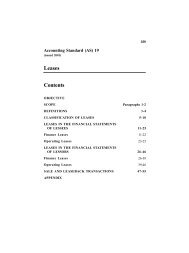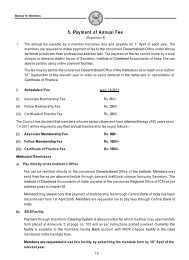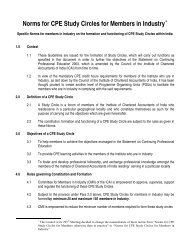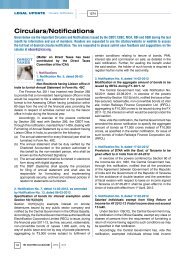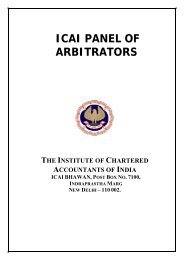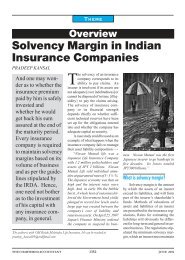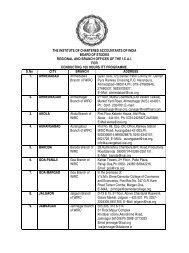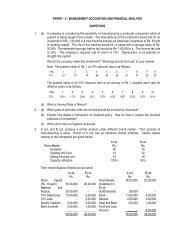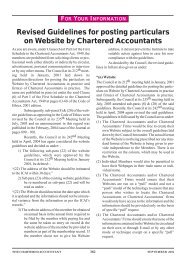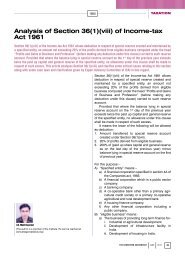The Chartered Accountant
The Chartered Accountant
The Chartered Accountant
Create successful ePaper yourself
Turn your PDF publications into a flip-book with our unique Google optimized e-Paper software.
y misrepresenting their earnings. Insurance companies<br />
have shied away from compensating companies as well as<br />
their executives in all cases of option backdating. In fact,<br />
the backdating scandal has yielded nothing but collective<br />
capitalization loss of over $5.1 billion (some put the figure<br />
at $8 billion). According to Glass Lewis, a shareholder<br />
consultancy firm from San Francisco, the companies that<br />
form a part of the scandal, seemed to have incurred penalization<br />
of over $10.3 billion including compensation<br />
expenditures.<br />
<strong>The</strong> Indian Scene<br />
Stock options were common in the Indian Software Industry<br />
till the entire industrial sector, including the software<br />
industry, received a jolt from Fringe Benefit Tax<br />
(FBT). <strong>The</strong> FBT has apparently brought an uneventful<br />
taxation. It is a dogmatic approach to levy FBT if a corporate<br />
employer provides some perks to his employee and<br />
does away with the same if a HUF in business, irrespective<br />
of its scale of operations or government/political party,<br />
awards the same to its employees. In fact, all these employers<br />
are collectively contributing to spiraling inflation<br />
in the form of increasing employees’ spending/purchasing<br />
power. Untimely elections are no less responsible for<br />
fueling inflation just like global oil price hike. Sec 49(2AA)<br />
of the Income-tax Act deals with taxing Capital Gains.<br />
Year of granting the option and year of opting to avail<br />
the option have also become important. If the employee<br />
exercised the option during 1999-2000, then the perquisite<br />
(FMV of the stock at the time of availing the option<br />
less acquisition cost incurred at the time of allotment by<br />
the employee) is chargeable to tax. Subsequently, no perquisite<br />
was assumed in respect of allotment of shares/securities<br />
even if employer made it available at concessional<br />
rate or with no charges. But, from the Assessment Year<br />
2008-09 onwards, the cost of acquisition at the time of<br />
transfer of specified security or sweat equity shall be the<br />
fair market value (FMV) which is taken into consideration<br />
for computing the value of fringe benefits in the hands<br />
of the employer.<br />
On transfer of such shares by the employee, capital gains<br />
would be taxable in the year in which shares/securities<br />
are transferred and the cost of acquisition is taken as the<br />
amount actually paid by the employees at the time of allotment/availing<br />
the option. Even if the employee gifts<br />
away the securities, there will be Capital Gains that arise in<br />
the year of gift and difference in FMV and cost of acquisition<br />
by the employee is the taxable gain.<br />
<strong>The</strong> benefit should flow from employer to his employee in<br />
order that employer will be held for FBT at 30%+SC+EC.<br />
In this category, among other things, fall specified security/<br />
sweat equity shares allotted or transferred directly or indirectly<br />
by the employer free of cost or at concessional rate<br />
to his present or former employee. FMV minus amount<br />
paid to acquire options thus will be liable to attract the FBT.<br />
Thus, for fear of having to shoulder additional burden of<br />
30%+SC+EC, the employer had applied brakes for pass-<br />
DECEMBER 2008 1028 THE CHARTERED ACCOUNTANT<br />
BANKING AND FINANCE<br />
ing on options to employees from 1/4/2007. This peculiar<br />
legal position has prompted some companies to enact the<br />
above ‘corporate lie,’- that is, backdating, in India too. But<br />
this needs verification by the Auditors/SEBI before one<br />
can comment on the happenings. Since Sarbanes Oxley Act<br />
is not applicable to Indian corporations operating only in<br />
India, the possibility of occurrence of backdating among<br />
them will be more than in the case of foreign companies<br />
operating in India and having employees in India (to whom<br />
the foreign company granted/proposes options), which are<br />
exposed to Sarbanes. But what about the FBT position if<br />
such foreign company grants options to its Indian employees<br />
in its foreign shares (holding company) instead of from<br />
its Indian subsidiary? Can the Holding company be considered<br />
as employer in such cases? Obviously not. Hence, FBT<br />
cannot be levied in such cases. But the twist here is that the<br />
grantor should not be the employer. If the grantor is employer,<br />
it becomes immaterial in which company he grants<br />
the options. Thus, for example, if an employer company<br />
grants options in shares held by it as investment belonging<br />
to another company, such options will attract FBT.<br />
It may be noted in this context that Circular No.8/2005/29-<br />
8-05 clarifies that if an Indian Company carries on business<br />
outside India but does not have any employees based<br />
in India, it would not be liable to the FBT in India. In<br />
such cases stock options to such employees will not be<br />
affected by FBT. It is also clarified in Question no. 22 of<br />
circular that FBT will apply to foreign companies only if it<br />
has employees based in India. FBT will apply, however, to<br />
liaison offices of foreign companies in India, if such offices<br />
have employees based in India. It must be noted here<br />
that exemptions, if any, under Double Taxation Agreements,<br />
are only in respect of incomes of the entity and<br />
will not be relevant for computing FBT. But Question No<br />
31 of the Circular clarifies that a foreign company having<br />
employees based in India, and as per the Article relating to<br />
dependent personal services in any treaty, remuneration<br />
received by all its employees is not taxable in India. Thus,<br />
such foreign companies are not affected by FBT in India.<br />
In the Indian context backdating has no special treatment.<br />
To keep the FBT to the minimum is in the interest of<br />
employers. So they rarely permit any act that increases<br />
their FBT load and at the same time they co-operate with<br />
employees in choosing ‘dating with options,’ which reduces<br />
FBT to the minimum. Thus, while granting Stock<br />
Options, even employers might act/induce the market in<br />
such a manner that the stock market prices of their shares<br />
are kept at favourable levels.<br />
<strong>The</strong> <strong>Chartered</strong> <strong>Accountant</strong>s need to watch out ‘options<br />
backdating’ and ‘options forward dating’ incidents among<br />
their corporate clients in India and help reduce uncalled<br />
for litigation from this exercise and submit revised returns<br />
where ever such exercises have occurred . <strong>The</strong>y need to<br />
study SEBI/ Company Law regulations too in respect of<br />
stock option backdating/forward dating and advise all the<br />
concerned parties accordingly.q



